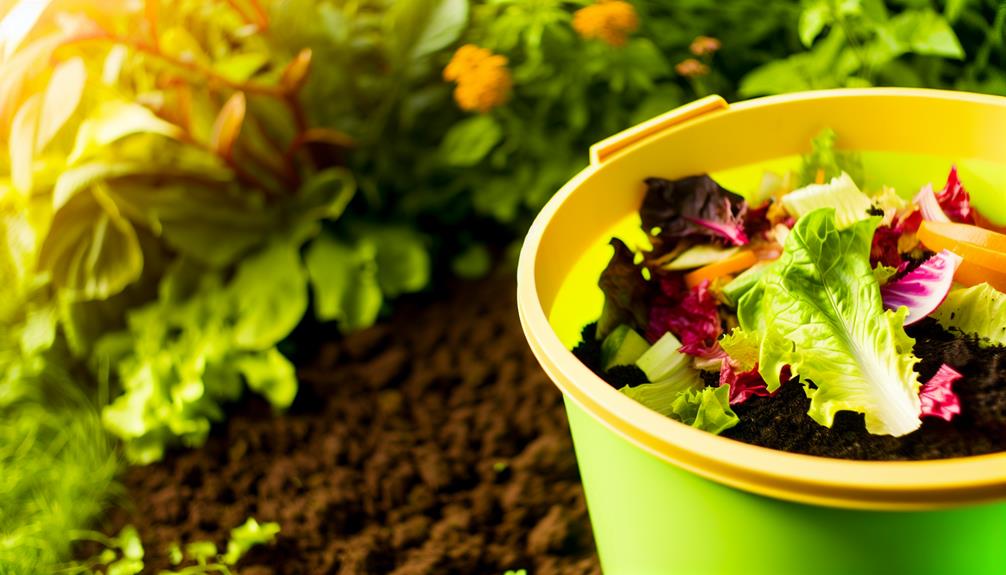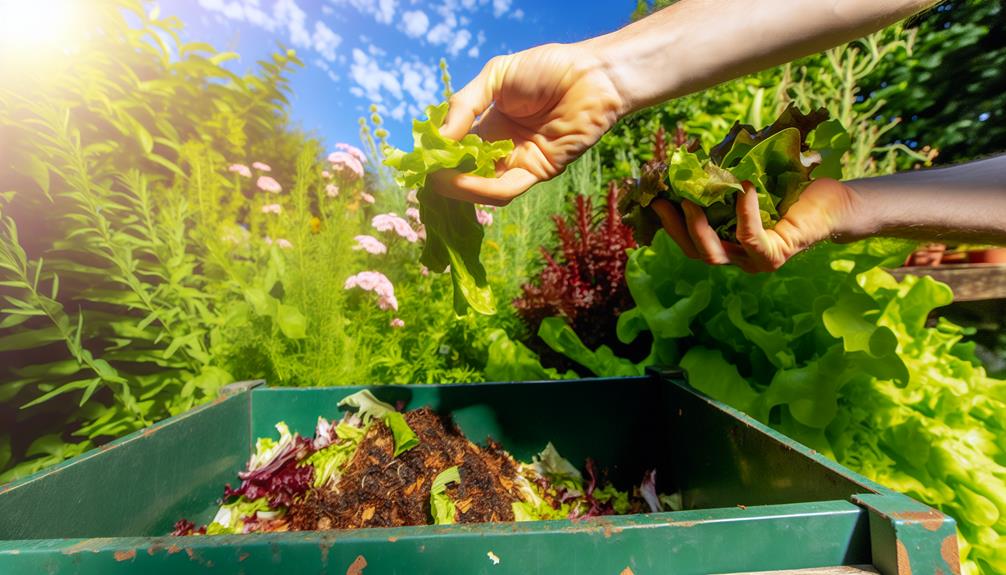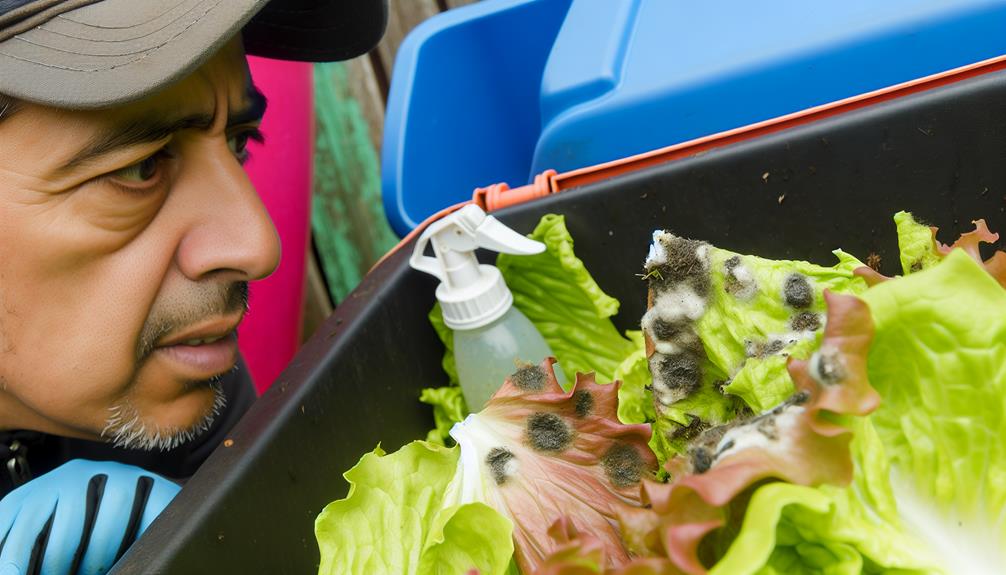

Yes, you can compost salad leaves to enrich your soil. Chop them into smaller pieces for faster decomposition. Use leaves like spinach, lettuce, kale, and arugula, but avoid those heavily pesticide-sprayed. Maintain the right carbon-to-nitrogen ratio by balancing greens with browns. Regularly turning the compost pile provides necessary oxygen and accelerates breakdown.
Removing any dressing or additives guarantees a clean and efficient composting process. Adding coffee grounds, crushed eggshells, and grass clippings can enhance the compost’s nutrient content. Keeping these tips in mind will prepare you for successful composting with salad leaves, improving your garden’s health. Next up: compost additives.
Composting salad leaves enriches your soil with essential nutrients. When you add these organic materials to your compost pile, you’re making a significant contribution to environmental sustainability. By composting, you’re reducing the amount of waste that ends up in landfills, which in turn lowers greenhouse gas emissions. This small act helps the broader community by promoting a healthier environment.
In organic gardening, composting salad leaves provides a cost-effective way to nourish your plants without relying on synthetic fertilizers. The decomposed leaves break down into nutrient-rich humus, which improves soil structure, water retention, and aeration. This makes your garden more resilient and productive.
You’ll also find that composting fosters a sense of connection to the natural cycle of growth and decay. It’s a fulfilling practice that ties you to like-minded individuals who care about the planet and organic gardening. By composting, you’re part of a community that values sustainability and natural processes.
Also Read: Can You Compost Ice Cream?
When you’re composting salad leaves, start with leafy greens like spinach, lettuce, and arugula. These greens break down quickly and enrich your compost with valuable nutrients.
You should also consider adding kale and Swiss chard to your compost. These leafy greens contribute essential minerals to the composting process.
However, avoid leaves that attract pests or are heavily sprayed with pesticides. It’s important to maintain a healthy compost pile by being mindful of what you add to it.
Among the best types of salad leaves to compost are spinach, lettuce, and kale. These leafy greens have a relatively short lifespan, making them ideal candidates for your compost bin.
When you add spinach, lettuce, and kale to your compost, they go through several decomposition stages. Initially, the leaves break down into smaller pieces, which then transform into nutrient-rich compost over time.
To guarantee efficient decomposition, tear or chop the leaves before adding them to your compost pile. This will speed up the process, as smaller pieces decompose faster.
Additionally, mixing these greens with browns, like dried leaves or cardboard, balances the carbon-to-nitrogen ratio, which is essential for effective composting.
Remember, the key to successful composting is maintaining a proper balance. Too many leafy greens can create a soggy compost pile, so mix them with other materials to maintain aeration.
Turn your compost regularly to provide oxygen, which helps break down the organic matter more efficiently.
For your compost pile, consider adding nutrient-rich salad leaves like arugula, Swiss chard, and beet greens. These leaves not only break down easily but also contribute greatly to soil enrichment and microbial activity. Including a variety of salad leaves in your compost can enhance the nutrient profile of the final product, making your soil richer and more fertile.
Here’s a helpful table to guide you on which salad leaves are beneficial for composting:
| Salad Leaf | Nutrient Contribution | Compost Benefit |
|---|---|---|
| Arugula | Nitrogen | Boosts microbial activity |
| Swiss Chard | Magnesium, Iron | Enhances soil structure |
| Beet Greens | Potassium, Phosphorus | Improves soil fertility |
| Spinach | Vitamins A, C, K | Increases soil nutrients |
| Romaine Lettuce | Calcium, Folate | Balances compost pH |
When you add these leaves to your compost, make sure they’re chopped into smaller pieces to accelerate decomposition. This practice helps speed up microbial activity, ensuring the organic matter breaks down efficiently. By incorporating these nutrient-dense leaves, you’re creating a compost that’s not only rich in essential minerals but also promotes a thriving ecosystem within your soil. Remember, a diverse mix of greens can make a substantial difference in your composting success.
To keep pests at bay, focus on composting salad leaves that naturally repel insects, such as arugula and spinach. These leaves act as natural repellents, making your compost less attractive to pests.
Here are four key tips to help you avoid common pests when composting salad leaves:
Also Read: Can You Compost Mail?
Before tossing salad leaves into your compost bin, make sure they’re free of any dressing or additives. This step is important because oils and other ingredients found in dressings can hinder the composting process.

Start by washing leaves thoroughly to remove any remaining residues. Rinse them under cold water, ensuring no bits of food or dressing cling to the surfaces.
Next, consider chopping greens into smaller pieces. Chopping helps the leaves break down more quickly, making your composting process more efficient. Use a sharp knife or kitchen shears to cut the leaves into manageable sizes.
Small pieces decompose faster, which means nutrients are returned to your compost pile sooner. This will also help maintain a balanced compost environment.
When composting, it’s important to balance greens like salad leaves with browns such as dried leaves or cardboard for best decomposition. This balance guarantees an ideal carbon ratio and proper moisture levels, which are vital for efficient composting.
Here are four steps to help you achieve this balance:
Also Read: Can You Compost Rust?
Balancing greens and browns is key, but you might still encounter issues like foul odors or slow decomposition in your compost pile. To tackle odor control, make sure your pile has enough browns, such as dry leaves, to balance the moisture-rich greens like salad leaves.

If it smells bad, it’s usually because it’s too wet or lacks oxygen. Turn your pile regularly to improve aeration and dry it out a bit.
Compost contamination is another common problem. Avoid adding diseased plants or leaves treated with pesticides, as they can introduce harmful substances. Stick to organic, untreated materials. If you accidentally add something problematic, remove it as soon as possible and monitor your pile for any signs of contamination.
Slow decomposition often results from an imbalance in your pile. If your compost isn’t breaking down, chop your salad leaves into smaller pieces to speed up the process. Also, check the temperature. A cold pile means microbial activity has slowed. Add more greens or a bit of water if it’s too dry, and cover it to help retain heat.
Also Read: Can You Compost Carrot Peel?
To supercharge your compost, consider adding natural additives like coffee grounds, eggshells, and grass clippings. These materials not only enrich your compost but also help it break down more efficiently. By incorporating these elements, you’re creating an ideal environment for beneficial microbes and accelerating the composting process.
Here’s a list of four items you can add to enhance your compost:
You shouldn’t compost salad leaves with dressing on them. Dressing contamination can harm your compost. Instead, rinse the leaves first. Using proper composting techniques guarantees a healthier compost and a stronger sense of community sustainability.
You’re wondering about the decomposition rate of salad leaves. Typically, it takes a few weeks to a couple of months, depending on the nutrient content and compost conditions. Your community garden will benefit from the rich compost!
You shouldn’t compost salad leaves with non-organic contamination or pesticide residue. Stick to organic, pesticide-free leaves to guarantee a healthy compost. This way, you contribute to a sustainable environment and feel part of the eco-friendly community.
Yes, you can compost wilted or slimy salad leaves. Their nutrient content benefits your compost heap, enhancing soil fertility. By composting, you’re contributing to a sustainable community practice that promotes environmental health and resourcefulness.
You might worry about pests in your compost bin, but using pest deterrents and regular compost maintenance can help. By turning the pile and avoiding excessive food scraps, you’ll keep your compost community thriving and pest-free.
Composting salad leaves is a simple way to reduce waste and enrich your garden soil. Remember to balance greens like salad leaves with browns such as dried leaves or paper.
Chop up your salad leaves for faster decomposition, and avoid adding any that are oily or dressing-covered. Troubleshoot common issues like odor or pests by adjusting your green-to-brown ratio.
Additives like coffee grounds or eggshells can enhance your compost’s nutrient content.

Don't let aphids, slugs, and caterpillars ruin another plant. Take back control with simple, natural methods that actually work.